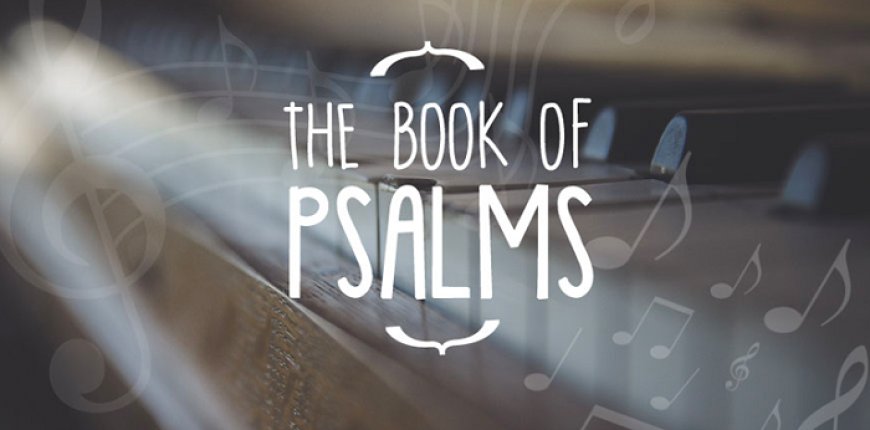Why Did Jesus Pray the Book of Psalms?
One of the clearest examples of this is His frequent use of the Book of Psalms. When Jesus prayed or spoke to His disciples, when He preached to the crowds, and even when He suffered on the cross, He often drew directly from the Psalms.

The life of Jesus, as recorded in the Gospels, reveals a man deeply rooted in prayer and Scripture. His words and actions were not isolated or spontaneous. They were filled with meaning, tied closely to the texts that shaped Jewish worship and identity. One of the clearest examples of this is His frequent use of theBook of Psalms?. When Jesus prayed or spoke to His disciples, when He preached to the crowds, and even when He suffered on the cross, He often drew directly from the Psalms.
This article explores why Jesus prayed theBook of Psalms. We will look at how the Psalms were used in Jewish life, how they express the full range of human emotion, and why Jesus found them fitting for prayer, teaching, and prophecy. By understanding His use of the Psalms, we gain insight into His heart, His mission, and His connection with all of humanity.
The Psalms in Jewish Life
A Songbook for the People
In Jesus time, theBook of Psalmsheld a special place in Jewish worship. These were not just poems or ancient hymns. They were used in the temple, in synagogues, and in daily prayer. Men, women, and children learned them by heart. They sang them in joy, and they recited them in sorrow. The Psalms gave voice to praise, lament, thanksgiving, and hope.
Jesus, like every Jewish boy, would have grown up learning the Psalms. He would have heard them at home, in the synagogue, and during festivals. When He prayed the Psalms, He was not doing something unusual. He was entering into the shared faith of His people. He was using words that had been spoken for generations.
The Psalms as Personal Prayer
While many Psalms were used publicly, they also served as personal prayers. Some Psalms cry out in anguish. Others give thanks for deliverance. Some plead for mercy, and some rejoice in Gods presence. These prayers reflect deep personal feelings, which is why they continue to resonate with people today.
Jesus prayed theBook of Psalmsbecause they were personal. He could take these ancient words and make them His own. When He spoke them, He was both human and divine. He was the Son of God and the Son of Man, using human words to speak eternal truth.
Jesus and the Psalms in the Gospels
In Teaching and Preaching
Jesus used the Psalms to teach others. He quoted them often when explaining who He was. For example, in Matthew 22, He referred to Psalm 110 to explain the identity of the Messiah. When the crowds asked questions, He answered with Scripture. When the religious leaders challenged Him, He responded with Psalms to show their misunderstanding.
TheBook of Psalmswas familiar to His audience. By quoting it, Jesus pointed them back to their own sacred texts. He invited them to see the Psalms in a new light. He revealed how they pointed forward to Him, to His mission, and to the kingdom of God.
In Prayer and Suffering
Nowhere is Jesus use of the Psalms more moving than in His final hours. On the cross, He cried out, My God, my God, why have you forsaken me? These words come from Psalm 22. This Psalm begins in deep anguish but ends in hope. By quoting it, Jesus expressed His pain but also pointed to victory.
Later, He said, Into your hands I commit my spirit, quoting Psalm 31. These were not random cries. They were prayers known to every Jew. They were expressions of trust in God, even in the face of death. Jesus prayed the Psalms as He died, showing that the Scriptures were on His lips even in His final breath.
The Psalms Reveal Jesus Identity
The Messiah in the Psalms
Many Psalms speak of a king, a deliverer, or a suffering servant. Christians believe these verses point to Jesus. For example, Psalm 2 speaks of Gods anointed one. Psalm 22 describes suffering that matches the crucifixion. Psalm 110 speaks of a priest and king forever.
Jesus prayed theBook of Psalmsbecause He saw Himself in them. They told His story long before He was born. They described His path of sorrow and His coming glory. When He prayed them, He was fulfilling them.
A Model of Obedience
Jesus showed perfect obedience to the Father. He lived in constant connection with God. By praying the Psalms, He showed submission to Gods word. He trusted the Scriptures. He believed they were true and powerful.
He did not use His own words alone. He prayed the words inspired by the Holy Spirit. He found in them everything He neededwords for joy, for grief, for trust, and for triumph.
The Psalms Connect Jesus to Us
Shared Humanity
The Psalms give voice to human emotion. They cry out in fear. They shout in joy. They question God. They praise Him. When Jesus prayed the Psalms, He showed that He understands our feelings. He felt hunger and thirst. He felt sorrow and loneliness. The Psalms allowed Him to share those feelings in words that others also knew.
By using theBook of Psalms, Jesus joined His voice with ours. He prayed like we pray. He suffered like we suffer. He teaches us to bring all things to God, just as He did.
A Pattern for Prayer
Jesus use of the Psalms teaches us how to pray. We can follow His example. When we are in distress, we can pray the Psalms. When we are thankful, we can sing their praises. When we feel abandoned or confused, we can find our voice in these ancient prayers.
The Psalms help us stay close to God. They give us words when our own fail. They remind us that others have felt what we feel. And they show us that God listens, no matter what.
Conclusion
Jesus prayed theBook of Psalmsbecause it was the language of His people. It was the heart of worship, the songbook of prayer, and the prophecy of the Messiah. Through the Psalms, He taught, He comforted, and He revealed His identity. He showed us that the Scriptures are not distant or cold. They are alive, filled with truth and grace.
By praying the Psalms, Jesus invites us to do the same. He shows us that in every seasonjoy or sorrow, peace or painwe can find words in the Psalms. They are prayers for all people, for all time. And in them, we can find the voice of Christ.





























